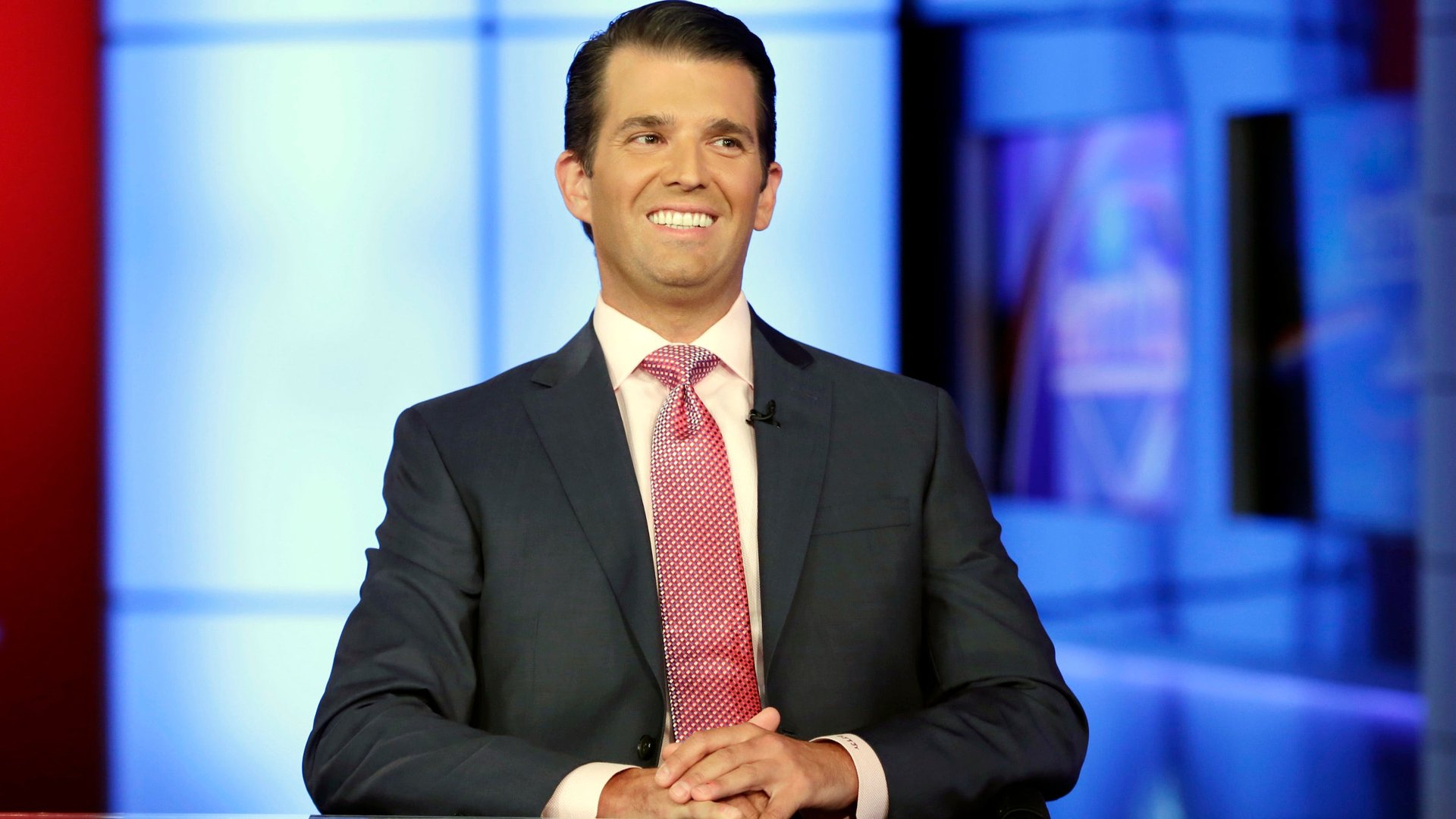Why Donald Trump, Jr’s meeting with a Russian lawyer wasn’t just typical “opposition research”
One pro-Trump response to the “I’d love it” e-mail—in which Donald Trump, Jr. eagerly accepted an offer from the Russian government to get damning information about Hillary Clinton during his father’s election campaign—is that it’s just the normal dirt-digging political campaigns do on opposing candidates.


One pro-Trump response to the “I’d love it” e-mail—in which Donald Trump, Jr. eagerly accepted an offer from the Russian government to get damning information about Hillary Clinton during his father’s election campaign—is that it’s just the normal dirt-digging political campaigns do on opposing candidates.
Indeed, some are arguing that the Clinton campaign likewise colluded—with Ukraine, in its case—to dig up dirt on the elder Trump. But the two situations aren’t really comparable.
As documented in an exhaustive Politico investigation in January, a Ukrainian-American consultant to the Democratic National Committee (DNC), Alexandra Chalupa, took it upon herself to investigate the connections between Russia and Trump. When Trump tapped Paul Manafort, who had a long career in Ukraine working for Russian-backed oligarchs, to run his campaign, it increased Chalupa’s suspicions.
Chalupa met several times with staff at the Ukrainian embassy in Washington, DC to ask questions about Manafort, Russia and Trump. The staff apparently shared their information freely with her and numerous American journalists. (At the time, I spoke with former Ukrainian officials about Manafort’s work there, but never spoke to anyone at the country’s embassy in the US.)
The DNC’s e-mail server, which US intelligence agencies says Russia hacked and leaked, reveals Chalupa’s conversations with DNC headquarters about her inquiries, but also that these talks did not go anywhere. DNC officials told Politico her information wasn’t worth putting in their briefing books, and Chalupa’s efforts to force a congressional inquiry fizzled. She left the DNC after the July nominating convention, when Clinton officially became the party’s leader.
So what does this tell us? Well, the most obvious legal concern for campaign officials is whether they knowingly solicited or accepted a thing of value from a foreign national, which would be illegal.
There’s no evidence that anyone from Clinton’s campaign itself had contact with Ukrainian officials; Chalupa acted on her own initiative. There’s also no indication that Democratic officials received any information of value from those contacts. While campaign research can be considered a thing of value—particularly if it is expensive to obtain, like large sets of voter or public opinion data, or if the person providing the information is normally paid for it in the course of their work—there is generally a wide latitude given when it comes to advice voluntarily given to campaigns. This is why, for example, the extensive brain trusts candidates assemble to advise them on policy aren’t required to register their work as in-kind contributions.
It’s possible that an aggressive prosecutor could construe Chalupa’s solicitation alone for information from the Ukrainian embassy as a crime, even if none of what she obtained was of value. However, those cases aren’t brought often: One could also consider Trump’s public request that Russia find and release Clinton’s e-mails as an illegal solicitation.
But the real legal concern is whether the campaign provided “substantial assistance” to Russian efforts to interfere in the election. Trump Jr.’s e-mails tell a different narrative about the Trump campaign’s relationship with Russia. In this case, senior campaign staff and relatives of the candidate—Manafort, Trump Jr., and his brother-in-law Jared Kushner—met someone described as a representative of the Russian government on June 9 with the explicit purpose of learning damaging information about Clinton. That suggests a direct link between the campaign and foreign nationals.
Furthermore, we know that there was something of value in existence—the private e-mail correspondence stolen from the DNC by Russian-employed hackers, which was leaked online a few weeks later—and that it was obtained by criminal means. While we don’t know if any of that was given in the meeting (Trump Jr has said the encounter yielded “no meaningful information”), the existence of this crime and the valuable information it generated makes the question of what the Trump campaign knew and when it knew it far more important to any potential conspiracy case.
Finally, let’s note the other stark differences in other aspects of the Clinton/Ukraine and Trump/Russia relationships. Trump and his entourage applauded and encouraged Russia’s hack of the DNC emails; his long-time political adviser Roger Stone even claimed advance knowledge of the revelations. Trump spoke highly of Vladimir Putin numerous times on the campaign trail and cast doubt on the assessment by US spies that Russia was behind the downing of a Malaysian airliner over Ukraine, killing 287 civilians. His team made a special point of changing the Republican party platform to make it more friendly to Russia. Numerous Trump campaign officials met with the Russian ambassador, Sergei Kislyak, and with representatives of financial institutions linked to Russia’s government, and many of them initially denied or didn’t fully disclose their participation in the meetings. And when the New York Times first broke the “I’d love it” story—before the incriminating emails themselves had surfaced—Trump Jr. and others at first claimed the meeting had been only to talk about adoptions of Russian children by Americans.
None of those things proves Trump’s collusions with the Russians. But contrast that pattern of denials—plus the fact that Russia was clearly trying to undermine Clinton’s campaign with its hacking efforts—with Chalupa’s and others’ willingness to speak on the record about their roles seeking information from Ukrainian officials.